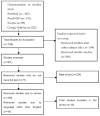Congenital Zika Infection and the Risk of Neurodevelopmental, Neurological, and Urinary Track Disorders in Early Childhood. A Systematic Review
- PMID: 34452535
- PMCID: PMC8402620
- DOI: 10.3390/v13081671
Congenital Zika Infection and the Risk of Neurodevelopmental, Neurological, and Urinary Track Disorders in Early Childhood. A Systematic Review
Abstract
It was late 2015 when Northeast Brazil noticed a worrying increase in neonates born with microcephaly and other congenital malformations. These abnormalities, characterized by an abnormally small head and often neurological impairment and later termed Congenital Zika Syndrome, describe the severity of neurodevelopmental and nephrological outcomes in early childhood, and the implication of microcephaly at birth. The purpose of the study was to describe the neurodevelopmental outcomes in children exposed to Zika virus during fetal life, with and without microcephaly at birth. The systematic review included research studies about the neurodevelopmental outcomes with and without microcephaly, as well as nephrological outcomes in early childhood. We searched PubMed, Crossref, PsycINFO, Scopus, and Google Scholar publications and selected 19 research articles published from 2018 to 2021. Most studies have linked the severity of microcephaly in childbirth to the neurodevelopmental and urinary outcomes in early childhood. However, most children without microcephaly at birth develop typically, while others may be at risk for language impairment.
Keywords: Zika virus infection; congenital Zika infection and neurodevelopment outcomes; congenital Zika infection and neurological outcomes; congenital Zika infection and urinary tract disorders; congenital Zika syndrome.
Conflict of interest statement
The authors declare no conflict of interest.
Figures
References
-
- WHO Director-General Summarizes the Outcome of the Emergency Committee Regarding Clusters of Microcephaly and Guillain-Barré Syndrome. [(accessed on 25 October 2020)]; Available online: https://www.who.int/news/item/01-02-2016-who-director-general-summarizes....
-
- Yan M., Luan R. Research Progress of the Causal Link between Zika Virus and Microcephaly. Glob. Health J. 2018;2:11–18. doi: 10.1016/S2414-6447(19)30178-2. - DOI
-
- Santa Rita T.H., Barra R.B., Peixoto G.P., Mesquita P.G., Barra G.B. Association between Suspected Zika Virus Disease during Pregnancy and Giving Birth to a Newborn with Congenital Microcephaly: A Matched Case–Control Study. BMC Res. Notes. 2017;10:457. doi: 10.1186/s13104-017-2796-1. - DOI - PMC - PubMed
-
- de Araújo T.V.B., Rodrigues L.C., de Alencar Ximenes R.A., de Barros Miranda-Filho D., Montarroyos U.R., de Melo A.P.L., Valongueiro S., de Albuquerque M.d.F.P.M., Souza W.V., Braga C., et al. Association between Zika Virus Infection and Microcephaly in Brazil, January to May, 2016: Preliminary Report of a Case-Control Study. Lancet Infect. Dis. 2016;16:1356–1363. doi: 10.1016/S1473-3099(16)30318-8. - DOI - PMC - PubMed
Publication types
MeSH terms
LinkOut - more resources
Full Text Sources
Medical



